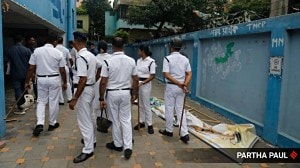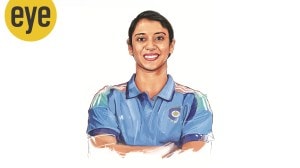How age-specific screening can help detect cancer early
Early diagnosis is now a proven life-saver for cancers of the breast, cervix, lung and colorectum, says Dr Abhishek Shankar, Assistant Professor in the Department of Radiation Oncology at AIIMS, Delhi
 There is growing evidence about the proven role of preventive strategies to minimise the risk of cancer and screening methods to detect cancer at an early stage for better survival. (Source: Freepik)
There is growing evidence about the proven role of preventive strategies to minimise the risk of cancer and screening methods to detect cancer at an early stage for better survival. (Source: Freepik) A 65-year-old gentleman came to see us with Stage 4 lung cancer with no prior history of smoking or second-hand smoke. His son broke down, fearing he wouldn’t survive. He was also anxious about his future, being a smoker and a social drinker. “Is there any way of early detection and prevention?” he asked.
Cancer has become a public health concern in India and has touched most families. In spite of the best efforts, most cancers are diagnosed at advanced stages leading to adverse outcomes. There is growing evidence about the proven role of preventive strategies to minimise the risk of cancer and screening methods to detect cancer at an early stage for better survival.
It is always advisable to consult a doctor in case you notice these signs and symptoms.
Breast cancer: Breast lump or thickening, redness, pitting, or any other changes to the skin over breast, nipple discharge and nipple retraction.
Cervical cancer: Vaginal bleeding in between periods or after menopause, vaginal discharge, pain in the pelvic area and back.
Lung cancer: Persistent cough, blood in sputum, chest pain, shortness of breath.
Head and neck cancer: Non-healing oral ulcer, white or reddish patch in the mouth, enlarged neck nodes, difficulty and pain during swallowing, change in voice, inability to open your mouth. Colorectal cancer: Alternating diarrhoea and constipation, blood in the stool, abdominal cramp or pain, unexplained weight loss.
Prostate Cancer: Frequent urination, weak urine flow, difficulty urinating, difficulty emptying the bladder, pain or burning during urination.
Vaccines are available for the hepatitis B virus, which can reduce the risk of liver and cervical cancers, respectively. HPV (Human papilloma virus) vaccines reduce the risk of cervical and other cancer types. Cervarix, Gardasil and Gardasil 9 are the currently available HPV vaccines. WHO now recommends a one or two-dose schedule for girls aged between nine and 17 years, a one or two-dose schedule for girls and women aged between 15 and 20 years, and two doses with a six-month interval for women older than 21 years. Gardasil 9, which covers nine subtypes of HPV and gives 100 per cent protection, is recommended at 0, 2 and 6 months (three doses) for all eligible age groups. It is highly recommended that you go for HPV vaccination as the virus is a risk factor for five cancers in women which are preventable. Early diagnosis and prevention is possible through screening, which refers to the use of simple tests across a healthy population without symptoms to identify the disease early. It is now a proven life-saver for cancers of the breast, cervix, lung, and colorectum. Following are the age group wise recommendations:
21-39 years: Persons with a family history of breast or colon cancer are recommended to start screening early if the risk is higher than average. Cervical cancer screening is suggested at 25 years with Primary HPV testing every five years or co-testing with HPV DNA + Paps test every five years or Paps tests every 3 years.
40-65 years: Those with an average risk can start screening for colon cancer by 45 with annual stool-based tests, colonoscopy every 10 years and sigmoidoscopy every five years. Annual mammography is recommended for women in the 45-54 year age group, then it is every two years for breast cancer screening. Cervical cancer screening must begin with Primary HPV testing every five years or co-testing with HPV DNA + Paps test every five years or Paps tests every three years. Lung cancer screening for persons with a smoking history of 20 pack years by low dose CT scan recommended after 50 years.
More than 65 years: Colon cancer screening for up to 75 years. Cervical cancer screening till negative results for 10 years with regular testing. Lung cancer screening must be done for up to 80 years.
Cancer screening is an important public health strategy that ensures better outcomes, but many people do not even try to approach health facilities.
— Don’t use tobacco products (cigarettes, beedi, zarda and paan masala)
— Make sure your home and workplace are smoke-free and avoid going to smoky places
— Try to maintain a healthy body weight through regular exercise and a healthy diet
— Be physically active in everyday life
— Have a healthy diet (low in fat, sugar, and salt)
— No alcohol intake as any amount of alcohol is bad for health



- 01
- 02
- 03
- 04
- 05




























